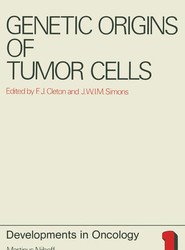(To see other currencies, click on price)
MORE ABOUT THIS BOOK
Main description:
The development of monoclonal antibodies to human tumor associated antigens has greatly facilitated the application of immunohistochemical techniques to analyze surgically removed tissues. During the last few years this approach has been utilized by a progressively increasing number of investigators to analyze malignant cells. Although monoclonal antibodies to tumor associated antigens have not become yet routine reagents in immunopathology, they have provided new information which could not be obtained with conventional antisera or histochemical procedures. The following are representative examples. TUmor associated antigens have been identified which display a restricted distribution in normal tissues and therefore may represent useful markers for radio imaging and appropriate targets for immunotherapy. In spite of undetec table differences with conventional histopathological approaches hetero geneity has been found in the antigenic profile of tumor cells within a lesion, in autologous lesions removed from different anatomic sites from a given patient and in lesions removed from different patients. Phenotypes of tumor cells have been identified which correlate with the biology of tumor cells and with the clinical course of the disease. From a practical view point the use of monoclonal antibodies in immunopathology has enhanced interactions between pathologists and immunologists, as exemplified by the present book. Such interactions have contributed to the application of basic research to clinical problems. The chapter of this book discuss investigations performed with monoclonal antibodies to antigens expressed by various types of normal and malignant human cells.
Contents:
I. Basic and Technical Aspects..- 1. Selection of monoclonal antibodies..- 2. Immunocytochemical techniques..- 3. Double immunoenzyme staining methods with special reference to monoclonal antibodies..- II. Tumor Associated Antigens..- 4. Monoclonal antibodies to oncofetal antigens..- 5. Cytoskeletal proteins as markers in surgical pathology..- 6. Immunological marker analysis in the various hematopoietic differentiation stages and their malignant counterparts..- 7. Monoclonal antibodies in lymphoma diagnosis and classification..- 8. Monoclonal antibodies recognizing melanoma-associated antigens..- 9. Monoclonal antibodies in breast tumor pathology..- 10. Monoclonal antibodies in clinical and experimental pathology of lung cancer..- 11. Monoclonal antibodies in diagnosis and prognosis of colorectal cancer..- 12. Monoclonal antibodies reacting with tumors of the urological tract or prostate..- 13. Monoclonal antibodies against ovarian cancer..- 14. Endocrine tumors..- 15. Application of monoclonal antibodies in cytopathology..- 16. Tumor associated antigens and oncogene products defined by monoclonal antibodies..- III. Practical Application and Case Presentations..- 17. Practical application of monoclonal antibodies in diagnostic tumor pathology and some future perspectives..- 18. Case 1: Carcinoma or large-cel lymphoma? Immunohistochemical approach of undifferentiated tumors in the skin..- 19. Case 2: Carcinoma or sarcoma?.- 20. Case 3: Type of sarcoma?.- 21. Case 4: Type of smal-cell undifferentiated cancer?.- 22. Case 5: Type of epitheloid and clear cell cancer?.- 23. Case 6: Mesothelioma or adenocarcinoma?.- 24. Case 7: Origin of metastatic carcinoma?.- 25. Case 8: Type of carcinoma in the liver?.- 26. Case 9: Metastatic meningioma: a rare cause of diffuse nodular lung disease..- Appendix: 1. List of monoclonal antibodies useful in histopathology..- Appendix: 2. Suppliers/distributors..- Index of Subjects..
From the same series
R. Verley
H.F. Seigler
Kenneth V. Honn
Franco M. Muggia
P. Hilgard
Noburo Kobayashi
James M. Church
L. Dogliotti
A. Giacosa
Seymour Garte
John Masters
Kintomo Takakura
B.A. Stoll
J. Mark Elwood
Laurence H. Baker
Laurence H. Baker
George D. Demetri
B.A. Stoll
A. Giacosa
Franco M. Muggia
Matthew J. van Zwieten
L.A. Liotta
Kenneth A. Foon
P.I. Reed
Paul H. Sugarbaker
Gabriel A. Kune
Frederick A. Valeriote
R. Ceriani
B. Lowenberg
D.G. Poplack
J. Bánóczy
Thomas R. Tritton
Miles P. Hacker
Aaron Polliack
B. Lowenberg
Pelayo Correa
Alexander H.G. Paterson
Franco M. Muggia
J. Aisner
Stephen T. Sonis
F.J. Cleton
Kenneth V. Honn
Stephen T. Sonis
Soldano Ferrone
Stephen B Howell
C.C. Tijssen
B.W. Hancock
B.W. Ongerboer de Visser
A.P.M. Heintz
B.A. Stoll
A.M. Ward
Daniel L. Kisner
Marvin A. Rich
J. Gordon McVie
J.R. Ryan
Marvin A. Rich
Kenneth V. Honn
D.G. Poplack
Anthony J. Mastromarino
Frederick A. Valeriote
Marvin A. Rich
Laurence H. Baker
P.K. Pattengale
G.B. Snow
Frederick A. Valeriote














































































